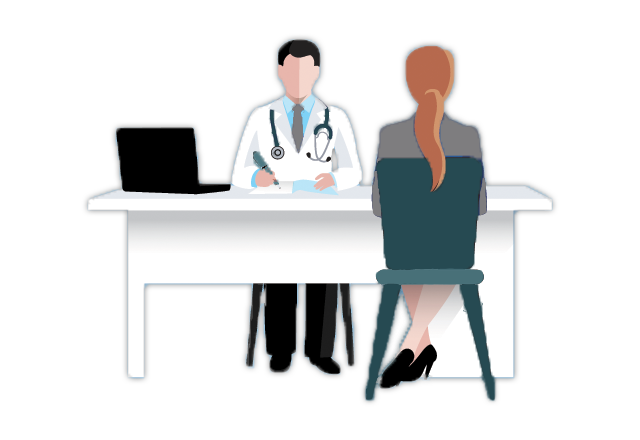Esophageal cancer is a complicated disease and treating it requires the expertise of providers from many specialties and an all-inclusive plan that focuses on caring for the whole patient. The Sidney Kimmel Comprehensive Cancer Center at Johns Hopkins offers a multidisciplinary team approach to diagnosis and treatment, palliative care services to provide relief from symptoms and improve quality of life, and clinical trials that offer benefits to patients, as well as an opportunity to impact future treatments for esophageal cancer.
The multidisciplinary team includes medical oncologists, radiation oncologists, thoracic surgeons, pathologists, gastroenterologists, pharmacists, palliative care specialists, and clinical trial coordinators.
This team thoroughly reviews each case and provides a personalized treatment plan for each patient. Patients are invited to a full day of meetings with our specialists, where they learn about their diagnosis and treatment plan and have the opportunity to ask questions. Once a treatment plan is finalized, all services can be implemented through our institution.
We understand a diagnosis of cancer is overwhelming and we know an approach to addressing all of the challenges that surround esophageal cancer treatment is the most effective way to care for patients. Our goals are to provide a comprehensive evaluation and plan to treat the cancer while also helping patients tolerate these treatments and manage the stress that comes with navigating a serious illness so they can continue with their daily lives.
On This Page: Why Choose Hopkins | What to Expect | FAQ's | Locations
Appointments and Referrals
Existing Patients
New Patients
Why Choose Johns Hopkins for
Esophageal Cancer Treatment
Our multidisciplinary clinic provides personalized treatment plans for each patient who has been diagnosed with esophageal cancer, including patients who are seeking a second opinion.
More Treatment Options
We provide all treatment options for esophageal cancer, including innovative clinical trials.

See Multiple Specialists in One Appointment
Meet with several experts in esophageal cancer within one visit.

Accessible Care

What to Expect at Your First Appointment
During their first visit, patients will meet with one of our medical oncologists to go through their health history. Diagnostic testing to confirm and stage each cancer will often also begin on the first day and could include an endoscopy with biopsy, an endoscopic ultrasonography, a PET scan, and/or a CT scan. Read more about diagnostic tests here. Along with offering comprehensive treatment plans to each patient, we also want to make you and your family as comfortable as possible throughout this process. Our main location at the Johns Hopkins Bayview Medical Campus offers free coffee, lunch boxes, and snacks every day and several rooms that overlook a beautifully-maintained garden and gazebo. Palliative care services to help with symptom management and stress are available to every patient at any disease stage.
Call To Make An AppointmentFrequently Asked Questions
-
Symptoms of esophageal cancer include trouble swallowing, chronic chest pain, unexplained weight loss, and persistent coughing or hoarseness.
-
Lifestyle factors can contribute to the development of esophageal cancer, including heavy alcohol intake, cigarette smoking, and obesity. Chronic acid reflux, gastroesophageal reflux disease (GERD), previous organ transplants, and Barrett’s esophagus, a condition in which the lining of the esophagus becomes damaged from acid reflux, can also be risk factors for esophageal cancer.
-
Staging is done according to the TMN classification system. “T” represents the extent of the tumor, “N” represents whether the cancer has reached the lymph nodes, and “M” represents whether the cancer has reached distant organs or structures.
The resulting classifications are grouped into six stages: Stage 0, Stage I, Stage IIA, Stage IIB, Stage III, and Stage IV. Stage I indicates tumors that have not metastasized or reached parts of the body that are further away from the primary site of the cancer, and Stage IV indicates metastasis.
-
Patients participate in diagnostic tests during their first one or two visits to gather information for a diagnosis. A multidisciplinary team—including specialists from medical oncology, radiation oncology, thoracic radiology, pathology, gastroenterology, pharmacy, palliative care, and clinical trials—then meets to determine a diagnosis and stage of the cancer and to create a personalized treatment plan for each patient.
-
Palliative care, which is available to patients at any stage of illness, focuses on offering relief from stress and symptoms, such as pain, nausea, constipation, and difficulty sleeping. It can help patients tolerate medical treatments so they can continue with their daily lives and improve the quality of life for both patients and their families.
Treatment for esophageal cancer depends on the stage of the cancer and includes palliative care services for all patients who have been diagnosed with esophageal cancer. A treatment plan can include one or more of the following:
Surgery
Often in combination with chemotherapy and radiation, surgery is generally performed for all stages of esophageal cancer with the exception of Stage IV. (Stage IV is usually treated with chemotherapy only, but surgery and radiation are also used in some cases to provide relief from symptoms.) Patients will generally be in the hospital for 5 to 10 days after surgery.
After that, patients will probably need services to learn how to swallow and manage a stent, which may be placed in the esophagus during surgery, and they may need to use a feeding tube during recovery.
Chemotherapy
Chemotherapy is a type of cancer treatment that uses drugs to interfere with the DNA of cancer cells, usually involves daily or weekly treatment sessions that last between a few weeks to several months.
Radiation
Radiation treatments last about 15 minutes a day and are typically given daily for five to six weeks. A patient is usually treated with 25 to 30 treatments (or fractions) of radiation.
Immunotherapy
Immunotherapy is a type of cancer treatment that uses drugs to reactivate your own immune system’s cancer-fighting T cells.
-
Post-treatment follow-up generally involves regular medical appointments in the months after treatment to monitor any treatment complications and to check for recurrence. If there is no recurrence, the time between appointments will lengthen.
-
A clinical trial is a type of study that enrolls volunteer patients in order to answer questions about drugs and other medical interventions. Participating in a clinical trial often offers benefits to patients. But the bigger value comes through being involved with efforts that can impact future treatments and procedures and offer future patients a chance at extended life or even a cure. Learn more about current clinical trials for Esophageal cancer.

